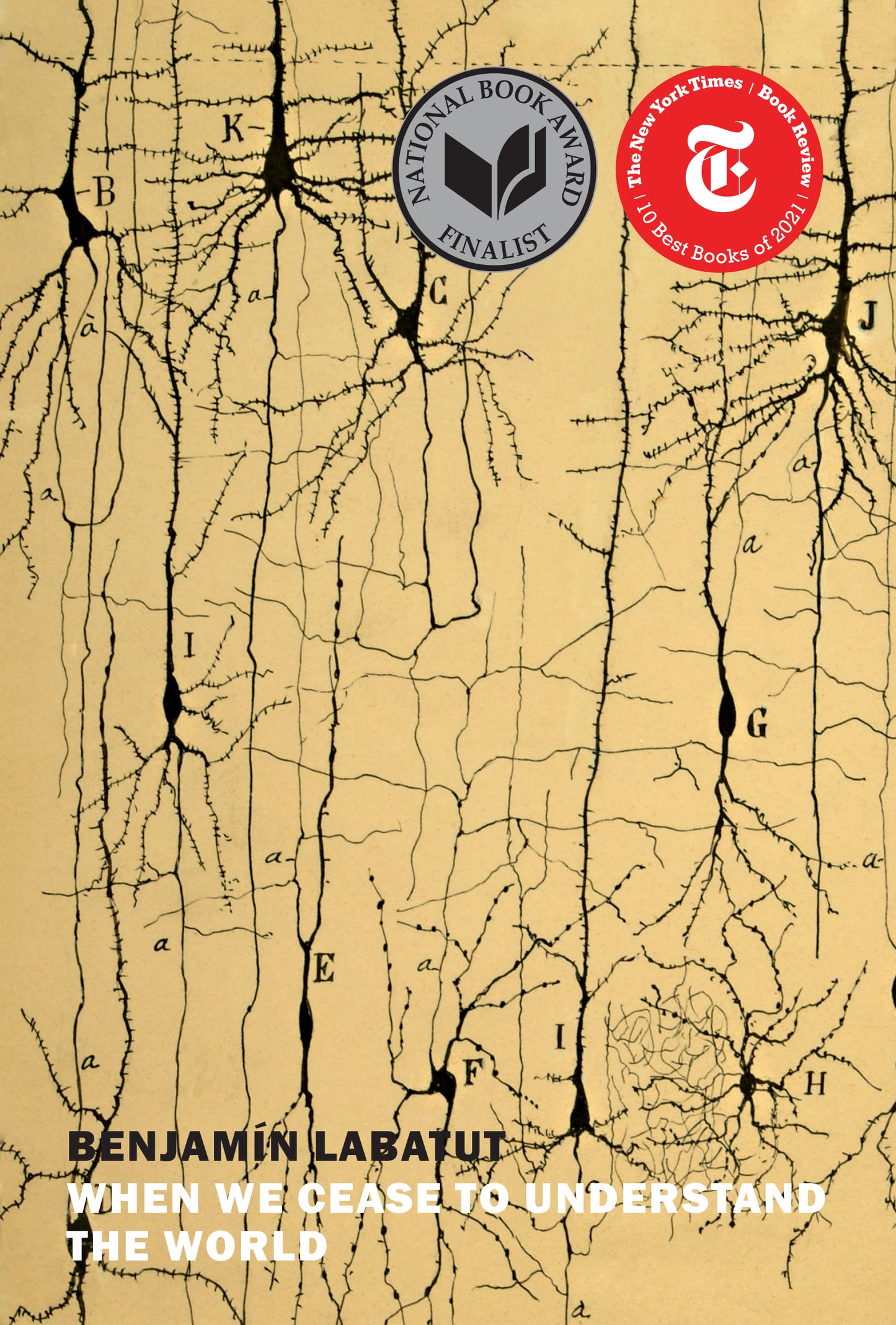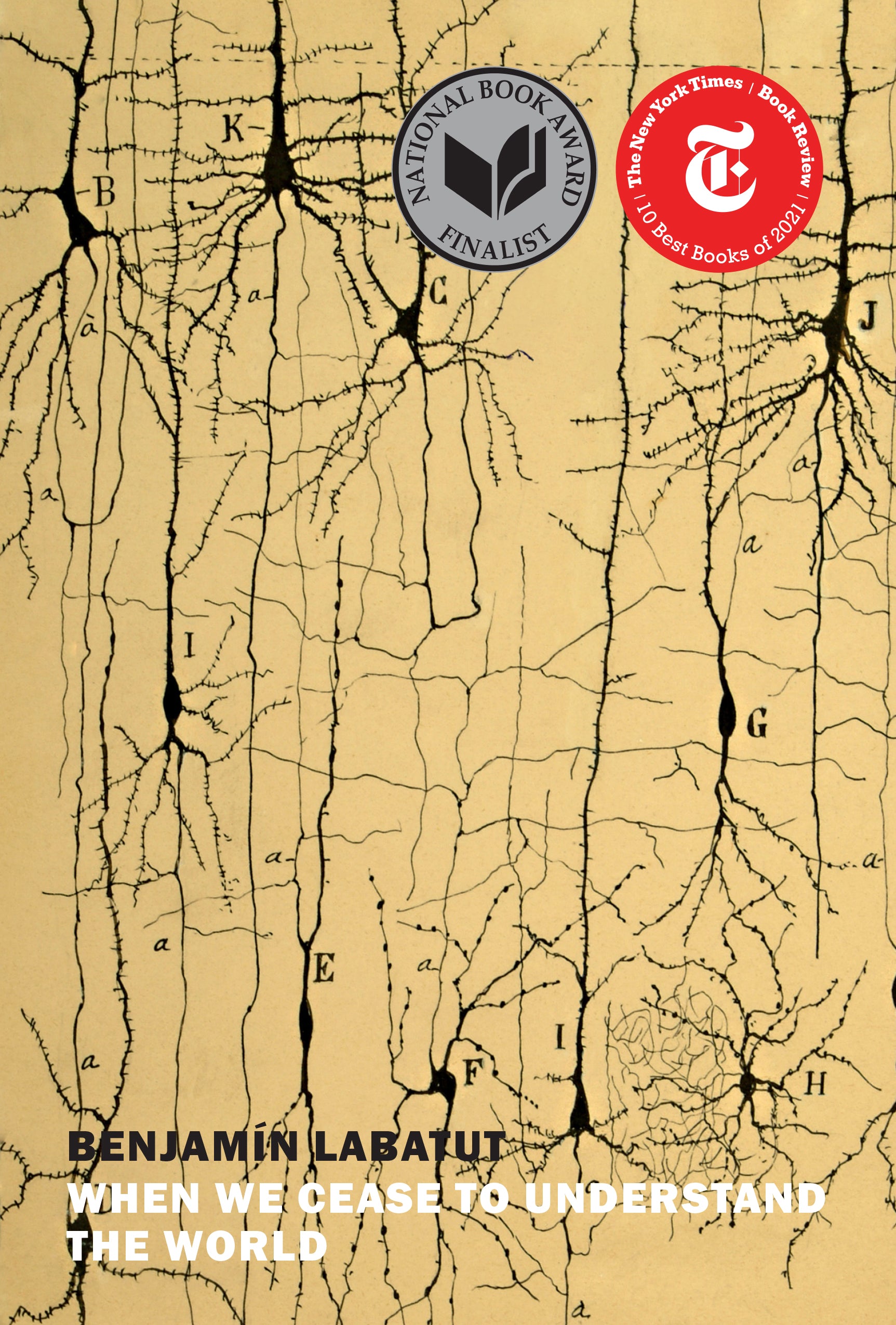Selected by President Barack Obama for his Summer 2021 Reading List
Finalist for the Los Angeles Times’s Art Seidenbaum Award for First Fiction
A gripping meditation on knowledge and hubris. . . . [Labatut] casts the flickering light of gothic fiction on 20th-century science. In five free-floating vignettes, he illuminates the kinship of knowledge and destruction, brilliance and madness. . . . His prose is masterfully paced and vividly rendered in Adrian Nathan West’s magnetic translation.
—Corinna da Fonseca-Wollheim, The New York Times Book Review
When We Cease to Understand the World fuses fact and fiction to turn the modern history of physics into a gripping narrative of obsessed scientists, world-changing discoveries, and the ultimate results—often quite dark—of our drive to understand the fundamental workings of the universe.
—John Williams, The New York Times Book Review Podcast
[A] meditation in prose that bears a familial relationship to the work of W. G. Sebald or Olga Tokarczuk: a sequence of accounts that skew biographical but also venture into the terrain of imagination. . . . The stories in this book nest inside one another, their points of contact with reality almost impossible to fully determine.
—Ruth Franklin, The New Yorker
Darkly dazzling. . . [Labatut] illustrates the unbreakable bond between horror and beauty, life-saving and life-destroying. . . . This book—as haunting as it is erudite—stubbornly insists on connecting the wonders of scientific advancement to the atrocities of history.
—Sam Sacks, The Wall Street Journal
Labatut’s stylish English-language debut offers an embellished, heretical, and thoroughly engrossing account of the personalities and creative madness that gave rise to some of the 20th century’s greatest scientific discoveries. . . [Labatut’s] subject is the all-consuming human drive to discover, and the danger therein. . . Hard to pin down and all the more enjoyable for it, this unique work is one to be savored.
—Publishers Weekly, starred review
[When We Cease to Understand the World] rattles the prevailing narrative of heroic scientific innovators.
—Mark Athitakis, The Los Angeles Times
When We Cease to Understand the World is one of the most beautiful books I’ve read all year, and one of the weirdest, too. Its subject seems to be scientific awe: the cosmic horror of seeing what lies at the center of the universe, and how very far such realities are from our small human ways of perceiving the world.
—Constance Grady, Vox
Absolutely brilliant. I was utterly gripped and wolfed it down. It feels as if he has invented an entirely new genre.
—Mark Haddon
A thrilling account of theories of physics, and as a series of highly-wrought imaginative extrapolations about the physicists who arrived at them.
—Geoff Dyer
When We Cease to Understand the World by Benjamín Labatut is the strangest and most original book I've read for years. It hovers in a state between fiction and non-fiction, or wave and particle, and makes an account of modern mathematics and science into something as eerie as a great ghost story.
—Philip Pullman, New Statesman, ‘Books of the Year’
A dazzling associative caper full of graceful arabesques linking continents and centuries and ideas.
—The Sunday Times Culture
Remind[s] us of fiction's power to take us to another world and expand our understanding of this one . . . When We Cease to Understand the World showcases the minds seeking to pierce the mysterious heart of mathematics.
—The Guardian, ‘Biggest books of autumn’
It may be possible to actually feel your brain getting bigger as you read.
—Evening Standard
Labatut has written a dystopian nonfiction novel set not in the future but in the present.
—John Banville, The Guardian
An exquisitely written and continuously fascinating hybrid work of fiction and history.
—Catherine Taylor, The Irish Times
Wholly mesmerising and revelatory . . . Completely fascinating.
—William Boyd
Using epoch-defining moments from the history of science, from Albert Einstein's theory of relativity to Erwin Schrödinger and Werner Heisenberg's opposing views on quantum mechanics, Labatut uses fiction to crack open the stories of scientists and mathematicians who expanded our notions of the possible, while also presenting them as human, all too human.
—Dazed






